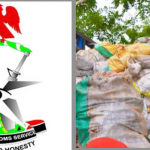A new report by Afreximbank Research has revealed that Nigeria is one of the 10 African countries that account for 69 percent of the continent’s total external debt.
The report, titled ‘African Debt Outlook: A Ray of Optimism’, released in February, showed that in the first half of 2024, 10 countries, including Nigeria, held most of Africa’s external debt, up from 67 percent in 2023.
According to the report, Nigeria alone makes up eight percent of Africa’s total external debt. Other countries with high external debt include South Africa (14 percent), Egypt (13 percent), Morocco (six percent), Mozambique (six percent), Angola (five percent), Kenya (four percent), Ghana (four percent), Côte d’Ivoire (three percent), and Senegal (three percent).
The report explained that Africa’s high external debt is due to several factors such as weak domestic financial markets, high global interest rates, and the rising demand for foreign exchange to fund imports.
“Africa’s external debt levels remain elevated, primarily due to the limited development of domestic financial markets and high interest rates. The growing demand for foreign exchange to finance imports has further exacerbated external indebtedness, fuelled by reliance on aid, concessional loans from multilateral institutions, and competitive rates offered by private creditors,” the report stated.
The report also pointed out that many African countries have taken on loans to fund critical areas like infrastructure, healthcare, and education, contributing to the debt rise.
It noted that Africa’s total debt-to-GDP ratio jumped by 39.3 percentage points after the 2008 global financial crisis, reaching 71.7 percent in 2023.
With high global interest rates, debt repayment has become more difficult, especially as many African nations borrow not just from traditional sources but also from private lenders and emerging bilateral partners.
To address these challenges, Afreximbank suggested steps for Nigeria and other African countries to ease their debt burdens.
“Africa is navigating a complex debt environment, but the tide can be turned through targeted, actionable policies. Policymakers must prioritise robust fiscal measures, engage strategically with debt relief initiatives, promote long-term growth, and advocate reforms to the global financial architecture,” the report advised.
The bank recommended improving value-added tax (VAT) collection, using digital tax systems to boost revenue, focusing public spending on essential sectors like healthcare, education, and infrastructure, and adopting performance-based budgeting.
It also encouraged the creation of well-equipped debt management offices (DMOs) to monitor debt levels and reduce financial risks.
Despite these concerns, Afreximbank said there are signs of improvement in Africa’s debt outlook. It expects global interest rates to fall, giving countries better access to capital markets and easing fiscal pressure.
While the risks remain, the report noted that Africa is making progress towards financial stability as it recovers from recent economic challenges.











